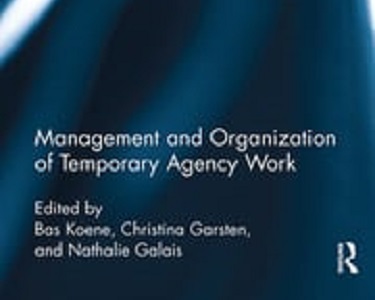The potential “spillover” of temporary agency work
Academic Publications

Author(s): Connelly, C. E., Gallagher, D. G., & Wilkin, C. L.
Date: 2014
Resource: In B. Koene, C. Garsten, & N. Galais (Eds.), Management and organization of temporary agency work (pp. 103-117). New York: Routledge
Worker behaviours do not take place in isolation; they are affected by what happens both within and outside the workplace. An illustration of this basic premise can be found in the extensive body of research that has been directed towards the study of “work-family” balance. Most basically, research on work-family balance is predicated on the underlying assumption that the demands and experiences that workers encounter in the workplace are likely to have an impact on their family relationships (Cousins and Tang 2004; Lewis and Cooper 1995). In a related vein, “family-work” balance suggests that family-related experiences infl uence an individual’s workplace-related attitudes and behaviours (Karatepe, Kilic, and Isiksel 2008; Kinnunen and Mauno 1998). It has also been observed, in the “work-leisure” literature, that negative experiences, such as work-related stress or perceptions of unfair treatment, affect how workers spend their leisure time (e.g., Wilensky 1960). Inherent in these streams of research is the application of “spillover theory,” which suggests that “positive or negative feelings in one life area may reach out and carry over into other facets of life” (Wiener, Vardi, and Muczyk 1981, 51). The notion of spillover has important implications for many types of work because it helps to account for the extent to which treatment or experiences in one context contribute to attitudes and behaviours in another environment.
Go to publisher page View all resourcesRelated Research Areas: Temporary and Gig Workers